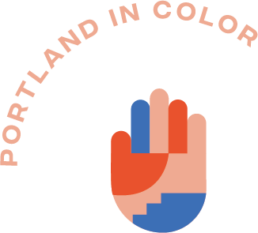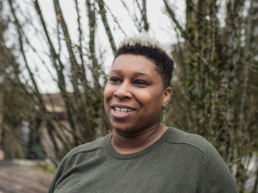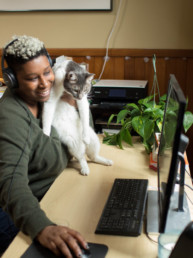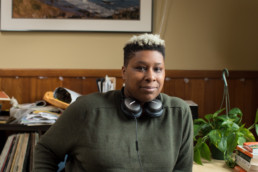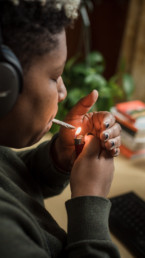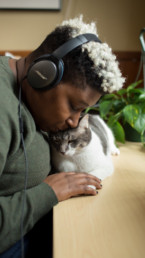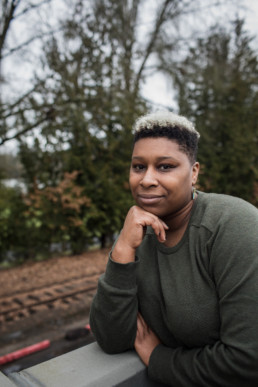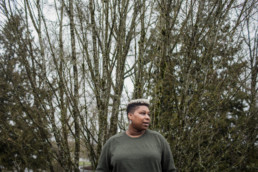TIARA DARNELL
“I’m not a fan of being told no or made to feel discounted in anyway.”
Name: Tiara Darnell
Pronouns: she/her
Background: Originally from Maryland. Came to Oregon in June 2014 to work in the wine industry and interned for seven months. [Previously] worked for OPB at the front desk.
Medium of choice: Audio, video, writing
Jam of the moment: Super Duty Tough Work. It’s a podcast hosted by two Ohio-based underground hip hop artists. It’s about hip hop, but goes deep on lessons about self-development and motivation, which any artist can relate to.
Local artists you’re excited about: Annika Izora, Jermaine Ulinwa, Tim Okomura, Intisar Abioto, and Amenta Abioto
WEBSITES
www.tiaramdarnell.com
linkedIn.com/tmdarnell
INSTAGRAM
@theartspj
@highgoodpeople
DONATE
cash app – $tmdarnell
A Maryland transplant who originally came to Oregon to work in the wine industry, Tiara Darnell has carved out a growing reputation as an ambitious multimedia journalist and visionary cannabis reform activist. Steeled over the years by other people’s attempts to define her limits and/or outright deny her potential, Darnell has not only proven she’s a force to be reckoned with as an entrepreneur, but has also made a point of elevating other talented voices of color along the way. As the host and executive producer of the High, Good People podcast, she highlights the stories of people of color relating to cannabis and how those stories intersect with issues of identity. Always looking to improve on her craft, Darnell is already making an indelible impact on the state and she’s only getting started.
“It’s really fun to see how all that past experience is combining with my experiences doing communications and content creation and allowing me to form something new that’s really my own.”
Can you talk about the experiences that motivated you to strike out on your own as an entrepreneur?
When I think about how and where I grew up, I feel so lucky, privileged, and thankful. I was surrounded by Black role models in my childhood, including my parents. But even with that, I still had doubts about myself, my intellect, and my value. It took the experience of living in Morocco for two years as a Black, American woman for me to realize my full self, capabilities, and how deep my capacity for fearlessness in the face of the unknown is.
Realizing that version of Tiara Darnell is what gave me the courage to trust my gut and to move to Oregon sight unseen, and alone, to work in an industry I had no experience in. Embracing that version of myself—plus a healthy dose of spite, if I’m being honest—is [also] what motivated me to excel after the director of my program at the University of Oregon (the white man who recruited me to the program in the first place) told me I was unemployable as an intern, even an unpaid one, because I was an inexperienced “N.U.B.” a “non-useful body.”
Believing in that version of myself is what compelled me to get a job working in the cannabis industry after another white guy I once looked up to told me he knew me and didn’t think I would be a good fit. The same [belief guided me in] quitting my job and starting my own journey in media and radio after it became clear that I would never be more than an administrative employee if I continued to work at OPB.
I’m not a fan of being told no or made to feel discounted in anyway. So, I’ve thrown myself into my work and into my craft as a direct result of those pivotal points in my path. I still have doubts and am extremely hard on myself at times when I shouldn’t be, but I think I move beyond those times more quickly than I used to. Or at least I try to anyway.
You originally came to Oregon to be part of the wine industry. How do you take your experiences from previous jobs and career paths and utilize them in the work you’re doing now?
The overlap between the wine industry and the cannabis industry is really interesting and surprising to me. My fleeting dream of becoming a wine sommelier didn’t happen but instead I feel like I became a weed somm of sorts through budtending and volunteering to be a Cultivation Classic judge. I get to bring a critical eye, nose, and endocannabinoid system to my “work” judging some of the best weed Oregon has to offer. I also get to write about weed, weed products, and culture as a freelance journalist and bring that experience into my podcasting endeavors. It’s really fun to see how all that past experience is combining with my experiences doing communications and content creation and allowing me to form something new that’s really my own.
What is your process? Specifically, when do you decide to take an idea and turn it into an actual project? How do you choose your medium?
My podcast is pretty specific in terms of what I’m looking for: a story that is related to cannabis, its intersection with a person of color, and whatever issue or identity might also lay in that same intersection. There are some stories that just lend themselves really well to being written about in print, video, or for a podcast. The writing is different for each one of those mediums. When I’m writing for a podcast, I’m really thinking, “Is this story going to be rich in sound? Does this lend itself well to an audio sensory experience?” When I’m writing for [podcast], “What are the ways I can use words and timing to bring a person along in a story that makes sense to listen to as an audio piece? Does it really need to have a visual?” If it does [need visuals], then I would probably pursue it as a visual story rather than an audio one. Writing for print versus audio versus video—a lot of people think would be the same and pretty easy to fit for each one—but it’s really its own unique beast.
What are some projects you are particularly proud of?
The first one that pops into my mind is the video I did with the NuLeaf Project. They are a Black-founded cannabis business accelerator program recently selected by the City of Portland to oversee the city’s social equity policy program for cannabis. They gave out the first of two grants, $30,000 each, to two Black-owned cannabis businesses here. I [produced] a profile video with [filmmaker] Donielle Howard [who] I had never collaborated with before and it was just an amazing experience. Not only did I get to be a part of the work I hope to be doing and would like to be doing full-time, but I also got to work with someone new who I didn’t know existed and has a similar passion, skillset to mine, and wants to collaborate in the future to make more content. It was really great to do something for Adrian Wayman, [owner of Green Box and one of two grant recipients from the NuLeaf Project]. One of the points [made] in the video is that people often overlook him because he is a Black man in the cannabis industry, which is why he’s not getting as much investment attention [that] someone who has a similar business but is white might have.
When did Portland become home for you and how does living here inform your work?
I’ve lived here going on five years but it feels like I didn’t really start “living here” until grad school was over […] My world has opened so much more now that I don’t have to worry about going to school. I’ve also changed. There was a moment in time where I wasn’t doing much after I finished school. Now this podcast, freelance writing, and shooting video have become a second full-time job. When I’m not doing my 9-5, I’m more than likely at home, still in front of a screen, working on a written story for a local publication, podcast episode, or editing video.
I’ve been really impatient lately with the lack of opportunity for the rich talent of writers, podcasters, videographers, and creatives of color in Portland. I’ve been thinking a lot about, “Do I want to stay here or do I want to move? What’s the cost-benefit analysis of moving to a market that’s bigger versus leaving a place that’s smaller but really needs to have talent like the people I count myself among here in Portland?” I don’t know that I have that answer yet, but I have a gut-feeling that I need to stay here and keep doing the work that I’m doing. In terms of writing about cannabis and being an activist around cannabis reform, there’s no better place to be than Portland and Oregon. The city has its own cannabis culture, but as a whole, the state is a leader in the movement for legalization and a really great place to build a niche for myself and a career for myself as it relates to cannabis.
How can Portland support you and/or your community?
This July, I’ll be teaching high school students the basics of podcasting–a first for me. I’m here to be a resource for any student but I would especially love to see my cohort be predominately youth of color. Support that for free by spreading the word about the summer course Producing Podcasts: The Sound of Stories, and the very flexible and accessible tuition assistance program for it. Support it with your wallet by making a donation to Portland Saturday Academy.
You can support me and the first season of my podcast by making a donation via Cash app $tmdarnell. The money will go toward production costs like bringing on a second producer, and to the general fund for an art + cannabis event I’m planning for the fall.
